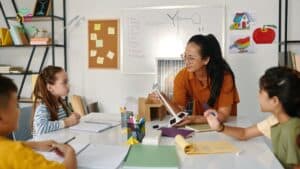When a child is diagnosed with autism, it does not only affects that individual, but it can also influence the entire family. One group that is often overlooked is siblings. These brothers and sisters may face emotional, social, and developmental challenges that differ from those experienced by children in families without autism.
Understanding the effects autism can have on siblings helps families and professionals support every child in the household.
The Emotional and Developmental Ripple Effect
Siblings of children with autism often experience emotional and developmental struggles that may not be immediately visible. While every child and family is different, patterns do emerge when looking at the broader picture.
Many siblings experience challenges in social communication, particularly if there’s a family history of other conditions like anxiety, schizophrenia, or intellectual disabilities. In such families, younger siblings might show lower verbal and nonverbal skills than their peers.
They may also have less well-developed adaptive behaviors, such as managing emotions or navigating social situations.
It’s worth noting that these effects are not just random. They often reflect a mix of genetic and environmental influences, which may put siblings at greater risk for their own developmental delays or emotional difficulties.
Understanding this connection can help with early identification of needs and lead to better support.
Sometimes, it’s not that the siblings are facing direct developmental challenges, but more subtle emotional impacts build up over time. The stress of living in a household where routines revolve around the needs of one child can affect the others in complex ways.
How Family History Shapes the Experience
A family’s background can strongly affect how siblings respond to having a brother or sister with autism. When there’s a history of mental health challenges, it increases the chances that non-autistic siblings will also experience emotional or behavioral issues.
Many siblings report feeling like they have less social support. This could be because the family’s energy is largely focused on meeting the needs of the child with autism, making it harder for parents to fully attend to the emotional needs of the other children.
As a result, siblings may feel overlooked, unsupported, or alone in their experiences.
Some may show higher levels of aggression or become more conflict-prone, especially in adolescence. Increased stress and anxiety are common, and these feelings can affect their ability to focus in school, form friendships, or enjoy time with family. Over time, this can lead to a noticeable drop in their overall quality of life.
Parents may not always realize the emotional load these siblings carry, especially if they seem independent or “well-adjusted.” But behind the surface, they might be struggling with complicated feelings about their family situation.
The good news is that these emotional challenges are not inevitable or unchangeable. With the right support and strategies, siblings of children with autism can learn to cope effectively and even grow stronger from their experiences.
One of the most important tools for helping siblings is open communication.
Parents can create safe spaces for children to talk about how they feel without fear of judgment or pressure. Letting siblings express frustration, confusion, or sadness can go a long way in helping them feel heard and understood.
Another helpful approach is providing age-appropriate education about autism. When children understand why their sibling behaves a certain way, they’re less likely to take things personally or feel confused.
This understanding reduces isolation and helps create a more supportive environment at home.

Programs designed specifically for siblings, such as those offered by the Sibling Support Project, provide structured activities that allow children to share their experiences, ask questions, and build resilience in a setting that validates their feelings.
Improving Quality of Life for All Children
One of the most important things to keep in mind is that the effects of autism on siblings don’t have to be negative. With awareness, support, and love, siblings can thrive even in the face of unique challenges.
Children and teens who grow up with a sibling on the spectrum often develop a strong sense of empathy, patience, and responsibility. These traits can become strengths that benefit them throughout life.
But for those strengths to flourish, the emotional burdens they face must be acknowledged and addressed.
Parents can help by being proactive. This means checking in regularly with each child, being mindful of how much attention is given to each family member, and seeking out resources that support the entire family. Encouraging participation in community programs, peer groups, and therapeutic services can create a well-rounded support system that benefits both the child with autism and their siblings.
Professionals, educators, and therapists also play a role. By including the whole family in care plans and educational discussions, they help ensure that no child feels invisible or forgotten.
Siblings need space to be themselves, explore their own interests, and express their own identities separate from their role in the family. Giving them room to grow outside of the autism context is key to helping them build a healthy sense of self. Just as we support neurotypical siblings in developing their individuality, it’s equally important to guide children with autism in positive and respectful ways—something we explore further in 5 Simple, Safe, and Effective Autism Discipline Ideas for Parents.
Final Thoughts
The presence of autism in a family brings both challenges and opportunities. For siblings, the journey can be filled with emotional ups and downs, but also growth, understanding, and resilience.
Recognizing the effects that autism can have on siblings and offering the right kind of support will help families create a nurturing environment where every child has the chance to thrive. That’s exactly what we aim to do at Jade ABA Therapy. We offer personalized, high-quality ABA services in Maryland designed not just for the child receiving therapy, but for the whole family.
Our team works closely with parents and siblings to build understanding, reduce stress, and promote positive relationships at home. If you’re looking for compassionate and effective support, we’re here for you. Contact us today to learn how we can support your family on this journey.
Sources:




